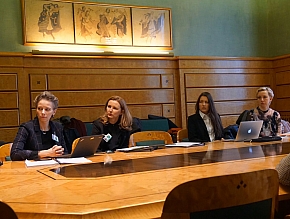 Gallery
Gallery
Latvia has made significant progress in promoting gender equality, and the country’s deliberate actions and sound policy are contributing to the elimination of discrimination against women, said Inese Lībiņa-Egnere, Deputy Speaker of the Saeima, on Tuesday, 11 February, in Geneva, Switzerland, taking part in the 75th session of the UN Committee on the Elimination of Discrimination against Women.
“Latvia has achieved considerable success by establishing a legal framework to prevent domestic violence and protect its victims,” said Lībiņa-Egnere, underlining that the society is becoming increasingly less tolerant of such offences.
The Deputy Speaker of the Saeima presented Latvia’s report on the implementation of the 1979 Convention on the Elimination of All Forms of Discrimination against Women from 1 January 2005 to 31 December 2017 to the Committee, mentioning the criminalisation of psychological abuse, stalking, and female genital mutilation. In addition, Latvia has taken several local and international measures to counter human trafficking, which includes reinforcing the fight against marriages of convenience.
Lībiņa-Egnere emphasised that Latvia has made great progress since the previous report and stressed that the accession to the European Union in 2004 fostered rapid development.
The Deputy Speaker also highlighted the importance of women’s economic rights. Latvia pays particular attention to achieving gender equality in education, labour market participation and remuneration, which is important for smart, sustainable, and inclusive development of the country.
Although Latvia’s score in the Gender Equality Index has increased, it still remains below the EU average. At the same time, the World Economic Forum has listed Latvia among the world’s top 20 countries in gender equality. In addition, the latest World Bank reports on women, business and legislation highlight Latvia as one of six countries in the world that ensures full legal equality between men and women in employment and business, noted the Deputy Speaker.
“Since the end of the financial crisis, Latvia has achieved remarkable results in women’s economic participation and representation in leading positions,” affirmed Lībiņa-Egnere, stressing that almost 75 percent of women aged 20-64 were employed in 2018. Moreover, women own a third of enterprises in Latvia and represent 65 percent of university graduates. Latvia is among the leaders when it comes to women’s participation in science, as 53 percent of scientists and engineers in the country are women. With 46 percent of leadership positions taken by women, Latvia is the top country in Europe in this regard.
Lībiņe-Egnere pointed out that the wage gap remains a topical issue. Women in Latvia earn 15.7 percent less than men, which is similar to the EU average. This gap further emphasises the need to focus on structural reforms in education and to encourage women to study natural sciences, information and communications technology and other disciplines traditionally dominated by men.
Inese Lībiņa-Egnere, Deputy Speaker of the Saeima, is on a visit to Geneva, Switzerland, until 12 February, taking part in the 75th session of the UN Committee on the Elimination of Discrimination against Women.
Saeima Press Service







